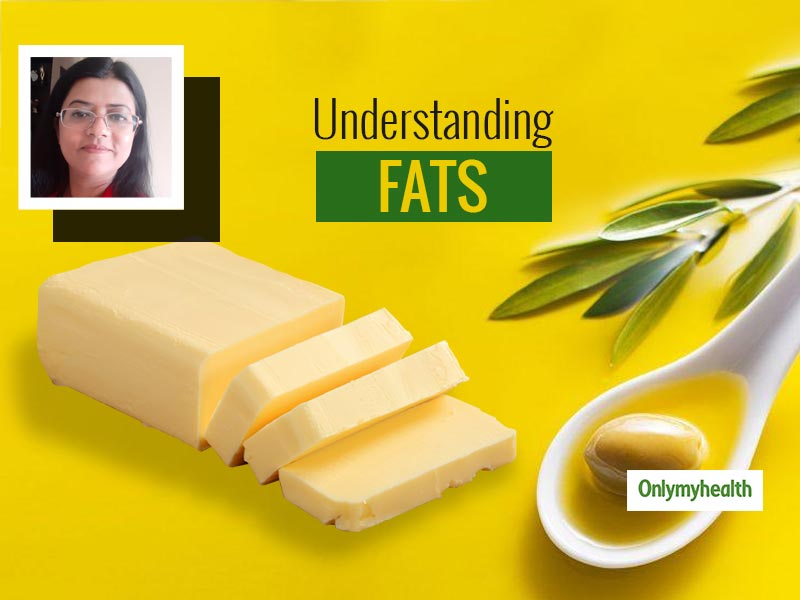
Fat is a concentrated source of energy and is an essential macronutrient which is essential for various functions in our body. It is a source of essential fatty acids which acts as a vehicle for fat-soluble vitamins (Vitamin A, D, E,K) and has a role in cell structure and membrane functions. Fatty acids, the building block of various lipids are classified into three groups:
Table of Content:-
Saturated fatty acid (SFA) - They are typically solid at room temperature, and their increased consumption may lead to an increase in bad cholesterol and heart problems. Saturated fats are found in butter, cheese, red meat, bakery products and other animal foods. Lot many commercial snacks contain saturated fat as it increases the shelf life of the products. Therefore, develop a habit of reading the labels correctly.

Also Read: How Much Ghee Should Be Consumed By Different Age Groups In A Day? Suggests This Nutrition Expert
Monounsaturated fatty acids (MUFA) - They are the healthiest of all fats and are liquid at room temperature. They help reduce bad cholesterol (LDL) levels which lower the risk of heart disease and stroke. MUFA is essential for maintaining body cells and contribute to the vitamin E levels too. Best sources of MUFA are olive oil, canola oil, peanut oil, sesame oil, avocados, nuts and seeds.
Polyunsaturated fatty acids (PUFA) - They also help in reducing bad cholesterol and the risk of heart disease if consumed judiciously. PUFA can be grouped into two series, namely omega-3 and omega -6 depending upon their structure. These are essential fatty acids which cannot be synthesised by our body and have to be compensated from food sources as they are essential for many body functions.
Omega- 3 fats - These are an integral part of cellular functions and provide an initiation point for making essential hormones. Rich sources of omega-3 fats are fatty fish like mackerel, sardines, salmon, some nuts like walnuts and seeds like flaxseeds, chia seeds, etc. Excess consumption of omega-6 fats like soybean oil, corn oil, etc. are associated with inflammation which is the underlying cause of most of the diseases human beings are developing in the present times. Therefore, one needs to be cautious about avoiding too much of omega -6 fats in the diet.

Trans fats - Trans fat are unsaturated fats and occur in both natural and artificial forms. Artificial trans fats are quite harmful, leading to several health problems, including coronary heart disease. These are generated when the oils are heated again and again and used in frying/cooking. Therefore, it is recommended that cooking oils once used for frying should never be used again. Instead, frying can be done in little/just sufficient oil to avoid the wastage. These fats are present in bakery items like cookies, cakes, etc. While buying food products from the market do keep a check on the food labels. But, some fats are healthy for the heart too.
Some saturated fats and their health benefits:
Coconut oil
Coconut oil is known to have antimicrobial properties which protect your skin, hair, promotes oral health, works as a natural moisturiser, reduces belly fat, increases metabolic rate, etc. It is beneficial for patients suffering from Obesity, Thyroid disorders, Alzheimer’s disease, Parkinson’s disease and even cancer. It has a high smoking point so it can easily be used for Indian cooking too. It contains medium-chain triglycerides which are easily digested by the liver. It also contains lauric acid which fights against the bad bacteria, fungus and viruses. It is a rich source of saturated fats but can easily be incorporated in your daily allowance of fat.

Pure Ghee
Pure ghee has many beneficial effects like improving memory, delaying ageing, boosting your mood, improving concentration, boosting immunity and may promote weight loss. Adding 1-2 tsp of pure ghee in your daily fat allowance/daily diet may work wonders.
Also Read: Oil Pulling For Immunity: More Than Oral Health, This Ayurvedic Peril Is An Immunity Booster Too
So, Which type of cooking oil should you select? To this, Nutritionist Kavita Rastogi adds, “While buying cooking oil from the market read the label carefully and look for cold-pressed/wood pressed oil which does not undergo commercial processing by heating at a very high temperature. While buying other items, see that they should be free from trans fats. Good oil should be low in saturated fat and omega -6 but high in MUFA and omega-3”.
With inputs from Nutritionist Kavita Rastogi, Founder - Nutriremedy
Read more articles on Healthy Diet
How we keep this article up to date:
We work with experts and keep a close eye on the latest in health and wellness. Whenever there is a new research or helpful information, we update our articles with accurate and useful advice.
Current Version